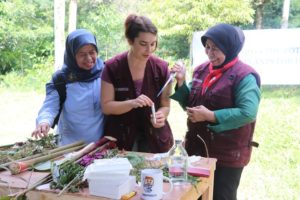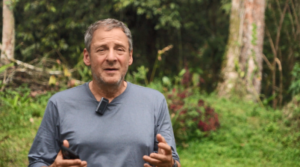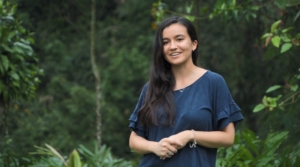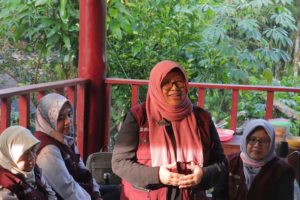As a mega biodiversity country, Indonesia plays a vital role in preserving its biodiversity, particularly tropical plants. To support this mission, the Universitas Nasional, in collaboration with the Center for Botanicals and Chronic Diseases (CBCD) Indonesia and Rutgers University, held a workshop introducing the Gibex method in Kampung Citalahab Sentral, near Mount Halimun Salak National Park, from July 2 to 4, 2022.

During the three-day workshop, researchers from Universitas Nasional, Universitas Pancasila, and Universitas Sriwijaya mastered the Gibex method, an innovative field-based technique for rapid screening of plant bioactivity. Focused on the biodiverse Citalahab Sentral region, participants conducted hands-on sampling and analysis to detect local flora’s antibacterial, antioxidant, and antifungal properties.
Backed by the NIH Fogarty International Center and the Asia-Pacific Network for Global Change Research, the Gibex method streamlines large-scale plant screening while minimizing environmental impact, making it a game-changer for sustainable research practices.

Over the course of three days, participants engaged in hands-on screening and training using the Gibex method—a rapid, field-based research technique that is non-destructive to both nature and plant life. “This method enables us to easily detect bioactive components in plants, which we then analyze for antibacterial, antioxidant, and antifungal properties,” explained Prof. Dr. Ernawati Sinaga, M.S., Apt., Vice Rector for Research, Community Service, and Cooperation, and Director of the Center for Medicinal Plants Research. She noted that the activity marks the second year of collaboration between UNAS and Rutgers University.
The Gibex method workshop was led by Prof. Dr. Ilya Raskin, Director of the Center for Botanicals and Chronic Diseases. He emphasized Indonesia’s vast potential in medicinal plants and highlighted how the Gibex method can support researchers in discovering and developing plant-based medicines.

Prof. Dr. Ilya Raskin
“The Gibex method can be a valuable tool for Indonesian researchers. It is a simple, environmentally friendly technique that enables scientific investigation without harming nature,” said Prof. Dr. Ilya Raskin. “This activity is especially beneficial for young researchers looking to develop medicinal plant studies.” Participants collected plant samples from Kampung Citalahab Sentral during the workshop, extracted them using a Dremel tool, and conducted an onsite analysis.
Dr. Sarah Skubel, Ph.D.
As a mentor for the analysis of antibacterial and antioxidant activities, Dr. Sarah Skubel outlined the stages of the workshop. “There were three main steps: we started by exploring the village to collect plant samples, then returned to the campsite to extract them, and finally applied specific reagents to test for antibacterial, antioxidant, and antifungal properties,” she explained. “We had to wait until the next day to observe the antibacterial results.” Dr. Skubel was supported by Isabel Armas, Antonia Kaz, and Prof. Dr. Vyacheslav (Slavik) Dushenkov from Rutgers University.

Dr. Nonon Saribanon, M.Si.
Dr. Nonon Saribanon, M.Si., expressed optimism that UNAS could take a leading role in applying the Gibex method to accelerate data collection on Indonesia’s rich biodiversity. “This method is highly valuable for researchers and students in Indonesia. As a megabiodiversity country, we must explore and understand our natural resources, particularly their medicinal potential,” she said. “The Gibex method is environmentally friendly and requires only about two grams of plant material for testing, making it ideal for large-scale screening.”
Prof. Dr. Syamsudin, M. Biomed., Apt.
Prof. Dr. Syamsudin, from Universitas Pancasila, emphasized the importance of this initiative in uncovering Indonesia’s vast natural wealth. He also encouraged young people to engage more deeply with Indonesia’s biodiversity as a source of high-quality medicinal raw materials.
Prior to the three-day field workshop held in Kampung Citalahab Sentral, Mount Halimun Salak, participants attended a theoretical training session on Thursday, June 30, 2022.